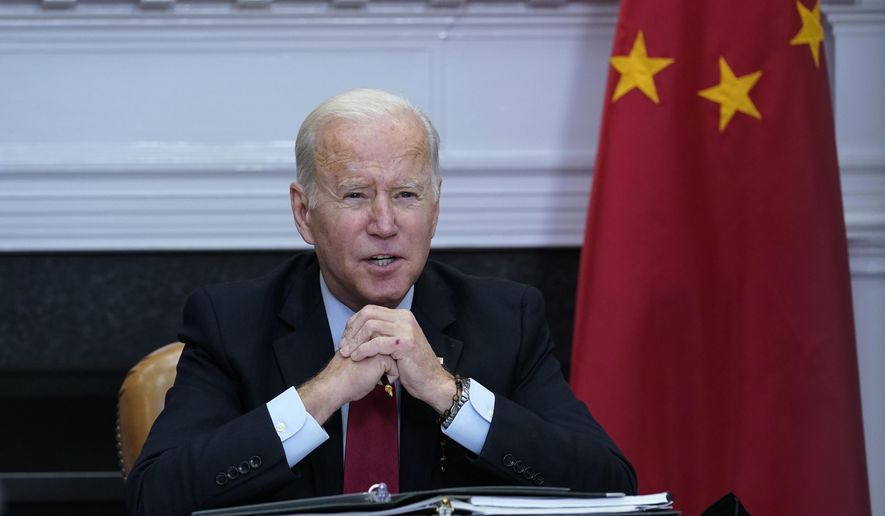The House passed its version of sweeping legislation aimed at bolstering U.S. competition with China, marking a culmination of months of negotiations that Republicans say did not include them.
The near-party-line 222 to 210 vote to pass the bill Friday set up a faceoff with the Senate over reconciling the vastly different proposals from the two chambers.
The nearly 3,000-page bill is a hodgepodge of stalled spending on U.S. science and technology, including $52 billion for semiconductor manufacturing and $45 billion to shore up U.S. supply chains.
Democrats have also slipped in provisions for other party priorities, including $8 billion to help developing countries address climate change. The bill also includes funding to make the U.S. less reliant on Chinese solar technology.
President Biden on Friday cheered the bill.
“The House took a critical vote today for stronger supply chains and lower prices, for more manufacturing — and good manufacturing jobs — right here in America, and for outcompeting China and the rest of the world in the 21st century,” he said in a statement.
Mr. Biden also criticized Republicans for not getting on board with the legislation.
“If House Republicans are serious about lowering prices, making our economy stronger, and competing with China from a position of strength, then they should come to the table and support this legislation, which does just that,” he said.
Republicans have railed against the bill as a “foreign policy failure” that funnels taxpayer dollars into an “unaccountable UN slush fund” without addressing threats to U.S. national security posed by China.
“This legislation could send U.S. taxpayer money to fund green energy projects built on the CCP’s genocide against its own people. To fund their slave labor. To prop up their forced abortions,” said Rep. Michael T. McCaul of Texas, the ranking Republican on the Foreign Affairs Committee.
“This is a moral issue. It’s the test of our time. If we allow this legislation to pass, we will be on the wrong side of history. We will be helping [Communist China] build the future of global energy on a foundation of slave labor and genocide,” he said.
Democrats dubbed the bill the COMPETES Act, arriving at that acronym with the title “Creating Opportunities for Manufacturing Pre-Eminence in Technology and Economic Strength” Act.
The bill serves as the lower chamber’s version of the Senate’s $250 billion U.S. Innovation and Competition Act which passed in June with the support of 18 Republicans and 50 Democrats.
The House version, on the other hand, has been plagued by months of stalled negotiations, and both chambers have toiled with separate versions of legislation that combine a wide swath of tough-on-China measures put forward by lawmakers.
House Republicans voiced frustration with the process, saying they have been sidelined while Democrats hammered out key details.
The bill is a priority for Democrats. The sweeping legislation would be a big win for Mr. Biden, who has been hobbled by a string of congressional failures.
Mr. Biden also has struggled to untangle a global supply chain hobbled by shipping delays and backlogs. And, the U.S. has been edged out of semiconductor manufacturing in recent decades by overseas producers.
In November, Democratic Party leaders in the House and Senate vowed to deliver the legislation to the president’s desk as soon as possible.
But a final bill could still be months away as the two chambers go to conference to smooth out differences between the House and Senate versions. The final bill will need support from 10 Republicans in the evenly divided Senate before it can be sent to the president’s desk.
As of Friday’s passage in the House, there were no firm dates set to begin negotiations, and it remains unclear if Democrats will have the political steam to get the bill over the finish line before midterm elections.
Sen. Todd Young, an Indiana Republican who worked on the Senate version, committed to making the final bill more palatable for House Republicans.
Both chambers will vote again on the final version once a deal is reached.
“We’ll send House Republicans a much better option to vote on in the next couple of months,” Mr. Young said.
• This story is based in part on wire service reports.
• Joseph Clark can be reached at jclark@washingtontimes.com.




Please read our comment policy before commenting.